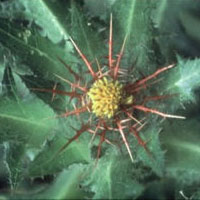Blessed Thistle
 © Steven Foster
© Steven FosterParts Used & Where Grown
Although native to Europe and Asia, blessed thistle is now cultivated in many areas of the world, including the United States. The leaves, stems, and flowers are all used in herbal preparations.
- Reliable and relatively consistent scientific data showing a substantial health benefit.
- Contradictory, insufficient, or preliminary studies suggesting a health benefit or minimal health benefit.
- For an herb, supported by traditional use but minimal or no scientific evidence. For a supplement, little scientific support.
Our proprietary “Star-Rating” system was developed to help you easily understand the amount of scientific support behind each supplement in relation to a specific health condition. While there is no way to predict whether a vitamin, mineral, or herb will successfully treat or prevent associated health conditions, our unique ratings tell you how well these supplements are understood by the medical community, and whether studies have found them to be effective for other people.
For over a decade, our team has combed through thousands of research articles published in reputable journals. To help you make educated decisions, and to better understand controversial or confusing supplements, our medical experts have digested the science into these three easy-to-follow ratings. We hope this provides you with a helpful resource to make informed decisions towards your health and well-being.
This supplement has been used in connection with the following health conditions:
| Used for | Amount | Why |
|---|---|---|
Indigestion, Heartburn, and Low Stomach Acidity | Refer to label instructions | Blessed thistle acts as a digestive stimulant and may be helpful for indigestion. |
Poor Digestion | Refer to label instructions | Folk medicine used blessed thistle tea for digestive problems, including gas, constipation, and stomach upset. |
Traditional Use (May Not Be Supported by Scientific Studies)
Folk medicine used blessed thistle tea for digestive problems, including gas, constipation, and stomach upset. This herb was also used—like its well-known relative, milk thistle1—for liver and gallbladder diseases.
Copyright © 2024 TraceGains, Inc. All rights reserved.
Learn more about TraceGains, the company.
The information presented by TraceGains is for informational purposes only. It is based on scientific studies (human, animal, or in vitro), clinical experience, or traditional usage as cited in each article. The results reported may not necessarily occur in all individuals. Self-treatment is not recommended for life-threatening conditions that require medical treatment under a doctor's care. For many of the conditions discussed, treatment with prescription or over the counter medication is also available. Consult your doctor, practitioner, and/or pharmacist for any health problem and before using any supplements or before making any changes in prescribed medications. Information expires December 2024.
